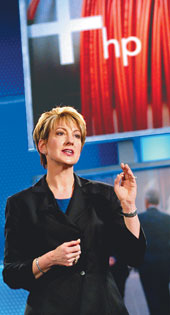 |
| Raw Deal? Carly Fiorina in happier times |
Two events during the past month have brought into sharp focus the role of change agents in an organisation. The first is the summary ouster of Hewlett Packard (HP) CEO Carly Fiorina. Just a few days earlier, when asked about her relationship with the board, she had replied ?excellent?. The other is the decision of Unilever to change its decades-old system of having two CEOs and two organisational structures. Henceforth, there will be only one CEO. There are likely to be huge saving (and job losses) in the ?merger?.
Take the Fiorina episode first. Everyone seems to be painting it as a defeat for the lady who has been repeatedly anointed America?s most powerful businesswoman. True, she has been skirmishing with the board ? more particularly Walter Hewlett, son of the company?s co-founder ? over her decision to acquire Compaq. The board, which largely sided with her, has struck back now.
But if you look beyond the fa?ade, Fiorina?s departure was inevitable. She was brought in as a change agent. Her mandate was to transform a techie company into a top-notch marketing outfit. Yes, profits are down. The company?s shares have received a hammering in the marketplace. But she has succeeded in what she set out to do. History will record that it?s a vastly different HP that she leaves behind.
A change agent is never welcome in any organisation. Most people are too set in their ways. Even when doom is staring them in the face, they don?t seem to recognise it. The attitude is: if it ain?t broke, why fix it?
The HP board recognised that things were breaking down. That?s why they called in Fiorina. Similarly, the top brass at Unilever, faced with stagnant sales and profits, have decided to restructure with a vengeance. The new Unilever CEO Patrick Cescau will probably be the change agent. Unlike Fiorina, he comes from inside the system. He was earlier joint CEO with now non-executive chairman Antony Burgmans.
 |
Fiorina and Cescau are (were, in Fiorina?s case) at the top of the ladder. It is much more difficult for a change agent who is somewhere in the middle of the hierarchy. It normally happens that way too. The CEO recognises that his company is sinking or that it is unable to adapt to a changing environment. He brings in somebody and expects him to work miracles. Unfortunately, the problem is very often the CEO himself. ?It?s extremely frustrating for any change agent,? says Mumbai-based HR consultant Shashi Rao. The big thing to remember is that nothing can be achieved overnight.
?Years of study and experience show that the things that sustain change are not bold strokes but long marches ? the independent, discretionary, and ongoing efforts of people throughout the organisation,? writes Rosabeth Moss Kanter, former editor of the Harvard Business Review. ?Real change requires people to adjust their behaviour, and that behaviour is often beyond the control of top management. That?s why, in difficult situations, leaders who have neglected the long march often fall back on the bold stroke. It feels good (at least to the boss) to shake things up, but it exacts a toll on the organisation.?
Organisations in India are very much in transition in this era of globalisation. In too many cases change has been assigned to an outside consultancy. They come, they recommend, they go away. And the organisation reverts to its old self. ?You need somebody inside to drive the change,? says Rao. ?You will be disliked and turfed out as a sacrificial goat once your job is done. But there will be many others queuing up for your services.? A change agent needs many a change too.











